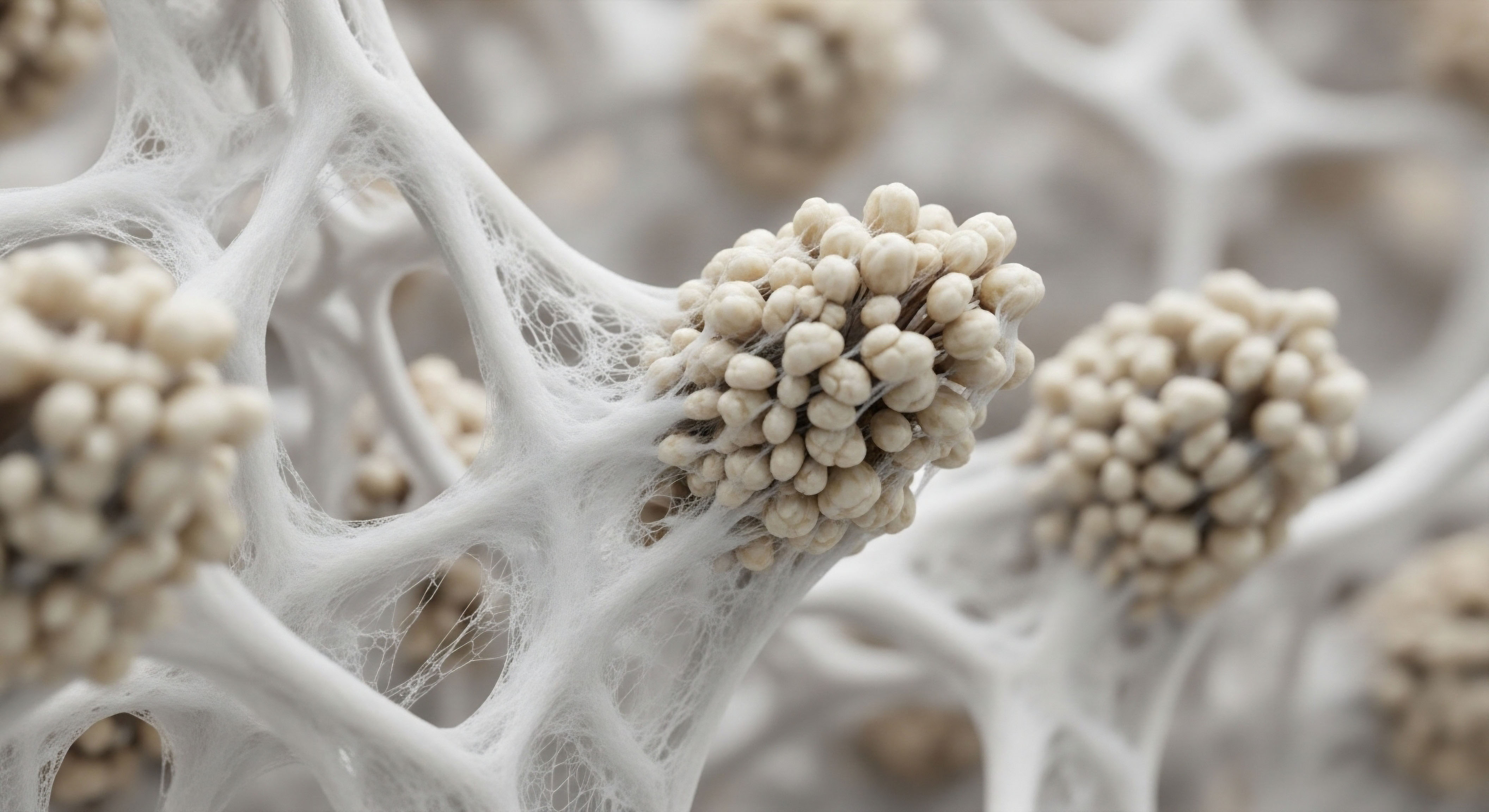

Fundamentals

The Connection between Lifestyle and Hormone Therapy
Hormone therapy is a medical treatment that involves supplementing or replacing hormones in the body to address imbalances. Its success is deeply intertwined with your daily habits, particularly your diet and exercise routine. A healthy lifestyle can significantly enhance the effectiveness of hormone therapy, helping you achieve optimal results and overall well-being.
Think of your body as a complex system where hormones act as messengers. Lifestyle factors like nutrition and physical activity can either facilitate or hinder the messages these hormones are trying to send. A well-balanced diet and regular exercise can help stabilize hormone levels, improve energy, and support the overall goals of your treatment.

Nutrition Basics for Hormone Health
A nutritious diet is foundational to hormonal balance. When undergoing hormone therapy, it’s important to consume a variety of nutrient-dense foods that support your body’s functions. This includes a mix of fruits, vegetables, whole grains, and lean proteins. These foods provide the essential vitamins and minerals your body needs to process hormones effectively.
Certain foods are particularly beneficial for hormone health. For instance, foods rich in omega-3 fatty acids, like fatty fish and flaxseeds, can help support hormonal balance. On the other hand, it’s wise to limit processed foods, sugary snacks, and excessive caffeine and alcohol, as these can disrupt hormone regulation.
A balanced diet rich in whole foods is essential for supporting hormone therapy and overall health.

The Role of Exercise in Hormonal Balance
Regular physical activity is another key component of a healthy lifestyle that can positively impact hormone therapy. Exercise helps regulate hormones like insulin, estrogen, and testosterone, contributing to a more stable hormonal environment. It can also help alleviate some of the symptoms associated with hormonal imbalances, such as mood swings and fatigue.
Both aerobic exercise and strength training have been shown to be beneficial for hormonal health. Aim for at least 150 minutes of moderate-intensity exercise per week, and choose activities you enjoy to make it a sustainable part of your routine. Walking, cycling, swimming, and yoga are all excellent options.
Instead of a sugary breakfast cereal, opt for a bowl of oatmeal with berries and nuts. This provides sustained energy and fiber, which can help regulate blood sugar and support hormone balance.
选择燕麦片、浆果和坚果,而不是含糖的早餐麦片。这能提供持续的能量和纤维,有助于调节血糖和支持荷尔蒙平衡。


Intermediate

How Specific Nutrients Influence Hormone Therapy
Delving deeper into nutrition, certain micronutrients play a significant role in the safety and efficacy of hormone therapy. For instance, adequate intake of B vitamins is important for liver function, which is responsible for metabolizing hormones. Foods like leafy greens, eggs, and legumes are rich in B vitamins.
Magnesium, found in nuts, seeds, and dark chocolate, is another mineral that supports hormone health. It helps regulate the pituitary gland, which is considered the “master” gland that controls the production of many other hormones. A deficiency in magnesium can lead to hormonal imbalances.

The Gut Microbiome and Hormone Regulation
The gut microbiome, the community of bacteria and other microorganisms in your intestines, plays a surprisingly large role in hormone regulation. A healthy gut microbiome helps to metabolize and eliminate excess hormones from the body. An imbalance in gut bacteria, on the other hand, can lead to the reabsorption of hormones, contributing to hormonal imbalances.
To support a healthy gut microbiome, it’s important to consume a diet rich in fiber from fruits, vegetables, and whole grains. Fermented foods like yogurt, kefir, and kimchi can also help to introduce beneficial bacteria into the gut. Probiotic supplements may be another option to consider, but it’s always best to consult with a healthcare provider first.
A healthy gut microbiome is essential for proper hormone metabolism and elimination.

Stress Management and Its Impact on Hormones
Chronic stress can have a significant impact on hormonal balance. When you’re stressed, your body produces high levels of the hormone cortisol. Elevated cortisol levels can interfere with the production and function of other hormones, including sex hormones and thyroid hormones.
Practicing stress-reduction techniques can help to keep cortisol levels in check and support hormonal balance. Meditation, yoga, deep breathing exercises, and spending time in nature are all effective ways to manage stress. Prioritizing sleep is also important, as lack of sleep can contribute to elevated cortisol levels.
| Food Group | Examples | Benefits |
|---|---|---|
| Lean Protein | Chicken breast, fish, lentils, eggs | Provides amino acids for hormone production |
| Healthy Fats | Avocado, nuts, seeds, olive oil | Supports hormone synthesis and reduces inflammation |
| High-Fiber Foods | Fruits, vegetables, whole grains | Promotes healthy digestion and hormone elimination |
| Cruciferous Vegetables | Broccoli, cauliflower, kale | Helps with estrogen metabolism |


Advanced

The Interplay of Hormones, Lifestyle, and Chronic Disease
The relationship between lifestyle, nutrition, and hormone therapy extends beyond symptom management and into the realm of long-term health and disease prevention. For individuals undergoing hormone therapy, particularly for conditions like menopause or gender affirmation, certain lifestyle choices can mitigate potential risks associated with treatment. For example, hormone therapy can affect cholesterol levels, and a heart-healthy diet low in saturated fats and high in fiber can help manage these changes.
Furthermore, lifestyle factors can influence the risk of hormone-sensitive cancers. A diet rich in plant-based foods and regular physical activity has been associated with a lower risk of certain cancers. For individuals on hormone therapy, these lifestyle choices become even more important in a comprehensive approach to health and wellness.

Nutrigenomics and Personalized Hormone Therapy
The emerging field of nutrigenomics explores how individual genetic variations can affect the body’s response to different nutrients. This personalized approach to nutrition has the potential to revolutionize how we approach hormone therapy. By understanding an individual’s genetic predispositions, healthcare providers may be able to provide more targeted dietary recommendations to optimize the safety and efficacy of hormone therapy.
For example, some individuals may have genetic variations that affect their ability to metabolize certain hormones or nutrients. In these cases, specific dietary interventions could be recommended to support hormone balance and reduce the risk of adverse effects. While still a developing field, nutrigenomics holds promise for a more personalized and effective approach to hormone therapy.
Nutrigenomics may offer a more personalized approach to nutrition and hormone therapy in the future.

The Role of Phytoestrogens in Hormone Modulation
Phytoestrogens are plant-derived compounds that have a similar chemical structure to estrogen and can bind to estrogen receptors in the body. They are found in a variety of foods, including soy, flaxseeds, and some fruits and vegetables. The role of phytoestrogens in hormone therapy is a complex and sometimes controversial topic.
Some research suggests that phytoestrogens may have a balancing effect on hormone levels, potentially reducing some of the symptoms of menopause. However, their impact can vary depending on an individual’s hormonal status and other factors. It is important for individuals undergoing hormone therapy to discuss the inclusion of phytoestrogen-rich foods in their diet with their healthcare provider to ensure it is appropriate for their specific situation.
| Lifestyle Factor | Positive Impact | Negative Impact |
|---|---|---|
| Diet | A balanced diet rich in whole foods can support hormone balance and reduce the risk of side effects. | A diet high in processed foods, sugar, and unhealthy fats can disrupt hormone regulation and increase inflammation. |
| Exercise | Regular physical activity can help regulate hormone levels, improve mood, and manage weight. | Overtraining or a sedentary lifestyle can contribute to hormonal imbalances. |
| Stress | Effective stress management can help keep cortisol levels in check and support overall hormonal balance. | Chronic stress can lead to elevated cortisol levels, which can interfere with other hormones. |
| Sleep | Adequate sleep is essential for hormone regulation and overall health. | Lack of sleep can disrupt hormone production and contribute to hormonal imbalances. |

References
- Bloom MedSpa. “Diet and Exercise Influence on Hormone Therapy Effectiveness.” N.p. n.d. Web.
- Oasis Clinics. “Balancing Hormones Through Nutrition & Lifestyle.” N.p. 15 Nov. 2021. Web.
- Miller, Sarah. “Why Nutrition Is Key During Gender-Affirming Hormone Therapy.” Jefferson Health, 11 Jan. 2023. Web.
- Endocrine Associates of West Village. “How Lifestyle Changes Can Help Restore Your Hormonal Health.” N.p. n.d. Web.
- Kubala, Jillian. “10 Natural Ways to Balance Your Hormones.” Healthline, 22 Aug. 2022. Web.



